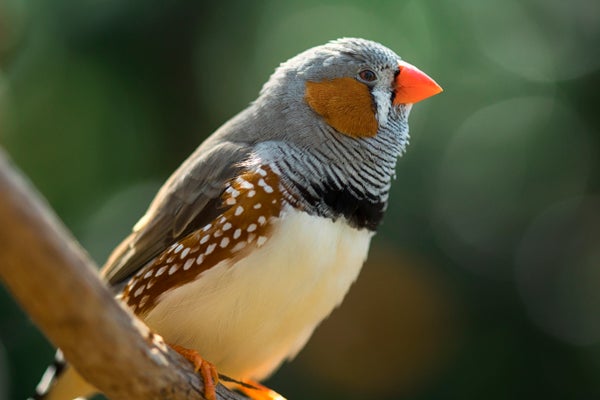
December 12, 2023
4 min read
Birds might sing in the morning because they need a vocal workout

A male zebra finch (Taeniopygia castanotis)
Most professional singers agree that practice makes perfect. And now research published in Nature Communications shows that songbirds also rely on a daily vocal workout—if they want to impress potential mates. The new study is the first to show that birds’ vocal muscles require exercise to achieve peak performance, the authors say.
The need for such a routine could help explain why so many birds sing early in the morning, according to the researchers. “Nobody really knows why they do that,” says lead study author Iris Adam, a biologist at the University of Southern Denmark. “Our research provides an … explanation: maybe they just need to exercise.”
To understand how a daily workout can affect birds’ vocal muscles, Adam and her colleagues prevented singing practice in a group of male zebra finches—a songbird species that, like humans, learns to vocalize through social interaction. In some of these animals, the researchers stymied singing by making an incision that stopped brain signals from reaching the syrinx (a bird’s vocal organ, similar to the human larynx). Other zebra finches were physically unaltered but kept in the dark, where they were able to make noise if they tried but were not motivated to sing.
Without practice, the birds’ vocal abilities quickly declined. In finches that were rendered unable to use their vocal muscles, these muscles were five times weaker after just two days. After three weeks they had atrophied to look similar to those of juveniles’ vocal organ. In birds that were kept in the dark, the syrinx lost 50 percent of its strength within a week.
After a week the researchers brought the latter finches back into the light, restoring their motivation to sing. The team recorded these birds’ songs following the lack of practice and compared them to recordings of the animals singing before the dark period. Most of the finches’ postintervention songs showed a drop in frequency and a more limited vocal range.
The researchers couldn’t hear a difference between the males’ songs before and after the break—but female zebra finches definitely could. The study team had trained female finches to peck keys that would play back specific recordings of these birdsongs. When given the option to play a male bird’s song before or after the training break, 75 percent of females preferred the “before” recording. Adam says this is a surprisingly strong preference.
These findings might help answer a long-standing question: Why do birds around the world sing in a daily dawn chorus? While some birds sing in the morning to maintain social bonds or defend territory, others (such as birds in captivity) have no clear reason to chime in. Scientists have hypothesized that dawn is an ideal time to sing because it doesn’t interfere with feeding or because sound transmission is best in early morning air. But these speculations have been difficult to prove. The new study suggests the birds might simply need to start their day with exercises to keep their voice in shape.
Male zebra finches do seem to be practicing when they sing alone or outside of clearly relevant social contexts, says Rockefeller University neuroscientist Constantina Theofanopoulou, whose work has focused on vocal learning in songbirds. The male finches have stable songs that they sing in a rote way to attract females; but when singing alone, Theofanopoulou says, they often improvise new notes or syllables.
These males “are being judged by the females on their vocal learning abilities,” Theofanopoulou says. “So whenever they are alone, they take this opportunity to practice and become better singers.”
Because birdsong contains information about prior singing practice, the collective music of a songbird population could inform scientists’ understanding of some birds’ past behavior and environment, Adam notes. “When a male is singing, he is also displaying his immediate past,” she says. His song contains information about how much time he has had to practice, if has had to search for food more than usual or if predators are around. “All of that will make [male birds] sing less and affect vocal performance,” Adam says. Birdsong complexity has been studied as an indicator of habitat quality, and the new findings show how song performance can provide clear signs of a bird’s condition.
The research could also help scientists understand vocal training and recovery in people. Examining the human larynx is challenging without dissection, so the new findings may help demonstrate how human vocal muscles respond to exercise. For example, the study showed that vocal muscles can become faster when trained, unlike limb muscles, which become stronger and slower.
“If you try to use limb muscle exercise paradigms for head and neck muscles, you would get a completely different outcome,” Adam says. “We can do much better if we understand how these muscles work.”
Source link







